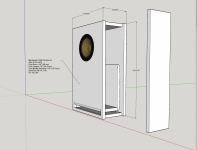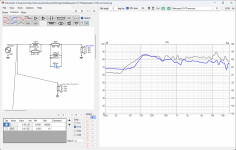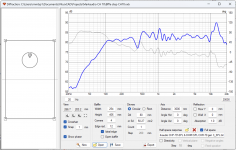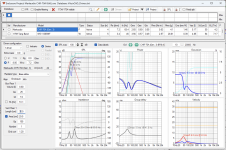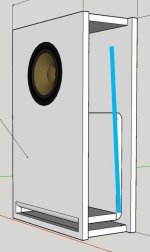Hey all, long time follower first time poster here! Wanted to share my first speaker design/build and get your constructive feedback!
Concept: A small speaker enclosure of 8.8L to be used as desktop/bedroom speaker and potentially a surround speakers for Dolby Atmos mixing studio (hence wide baffle design and front facing port opening).
Specs as simulated attached (VirtuixCAD):
Few questions:
I am new to this but have dove head in to speaker design and it is such a fascinating field! Being a long time audiophile as well as music "home" producer I am very excited to be learn!
I very much look forward to your feedback! Thank You!
Concept: A small speaker enclosure of 8.8L to be used as desktop/bedroom speaker and potentially a surround speakers for Dolby Atmos mixing studio (hence wide baffle design and front facing port opening).
Specs as simulated attached (VirtuixCAD):
- Markaudio CHR-70 (Gen 3)
- 8.8L (0.31 cuFt)
- Port Area: 4.5" (29 cm)
- Port Length: 12" (30.5 cm)
- Port Opening: 1/2" (12.7mm)
- Box/Port FB: 51.1 Hz
- F3: 53.2 Hz
- Additional notes:
- Will most likely be used with plate amp and DSP (baffle step correction and minor room management to be implemented via DSP)
Few questions:
- Aside from front facing port, what other factors should one account for a near or on wall design?
- Slotted port: my port narrow dimension is 1/2 inch. Could this narrow dimension port pose noise/chuffing issue as it does in tube vent thats are smaller diameter? At full power of 20 watts velocity is at around 11 m/s at 43 Hz
- And although I do not see this speaker being driven with more then 8-10 watts max, excursion simulation is not laving me with much headroom... any potential remedies a side from changing/looking for a new driver?
I am new to this but have dove head in to speaker design and it is such a fascinating field! Being a long time audiophile as well as music "home" producer I am very excited to be learn!
I very much look forward to your feedback! Thank You!
Attachments
Last edited:
This looks very similar to a sim of the CHR-Kens (they ar e9 litres net). My simulator suggests the vent should be 366mm (13.23”).
F6 in the low 40s, F10 upper 40s, F3 is meaningless to humans (ref Toole).
Start without the filters, and get 100 hrs at least (low level) before you start listening seriously.
The high aspect vent adds R and tends to knock down the hump. Will also sloow the roll-off and increase the reach in the bass. Do remember that the sim is anechoic and in room you can usually squeeze a bit more out of them.
It is very similar to the CGR CHR-Ken: https://frugal-phile.com/boxlib/P10free/CGR-dCHR-Ken-301113.pdf
dave
Last edited:
Very nice. If you changed the vertical board it would become a tapered ML-TL that I call TLonken. (Even after you've made the BR you can still add a short slanted extension for comparison.)
Perhaps parallel 10uF to reduce the notched dip at 1.3khz.
Perhaps parallel 10uF to reduce the notched dip at 1.3khz.
Attachments
Last edited:
I think rm-studio's box is a good design.
I think CHR70.3 can get high performance with a box of about 9 liters.
I use 9 liters with port tuning at 80Hz.
I don't use filters or DSP.
I think CHR70.3 can get high performance with a box of about 9 liters.
I use 9 liters with port tuning at 80Hz.
I don't use filters or DSP.
When i try to recreate your sim in WinISD i get a port of 30.47cm length, so more or less your result. Your sim is right, and your box will probally work. So not bad for a first... Planet10's sim is a bit larger box with a bit lower tuning that also will work btw. Differences between the two will be small in reality.
Interesting, what software can I simulate the effects of the tapered ML-TL?Very nice. If you changed the vertical board it would become a tapered ML-TL that I call TLonken. (Even after you've made the BR you can still add a short slanted extension for comparison.)
Perhaps parallel 10uF to reduce the notched dip at 1.3khz.
Glad to hear results are similar.. being a newbie it’s always concerning Morrow spits out correct numbers as there’s so many parameters that I can miss by accident and screw it up. 🤯, appreciate you running the Sim.When i try to recreate your sim in WinISD i get a port of 30.47cm length, so more or less your result. Your sim is right, and your box will probally work. So not bad for a first... Planet10's sim is a bit larger box with a bit lower tuning that also will work btw. Differences between the two will be small in reality.
What are you using for your software?
I think most members use HornResp; the slot to be modelled as round tube. Myself, I have accumulated enough experience over a couple years stuffing them into speakers (dividers made of cardboard or ply) I can now estimate the quarterwave including taper-ratio effect and delay-related reinforcement (from 1.2 to 6 times line length wavelength backwaves add constructively; I'm not sure if software simulates this). Suggest taking one speaker and inserting a piece of cardboard to hear what I'm talking about, BR becoming TL.Interesting, what software can I simulate the effects of the tapered ML-TL?
p.s. Going a step further, if the bottom slot does two U-turns making the line 40" (quarterwave 60hz), the bass will be better. Or the slanted divider could go the other way making the line 44" tri-fold-plus-slot, but the 4" internal depth gets rather tight!
Last edited:
- Home
- Loudspeakers
- Full Range
- 8.8L small Markaudio CHR-70 build - first time speaker designer/builder
